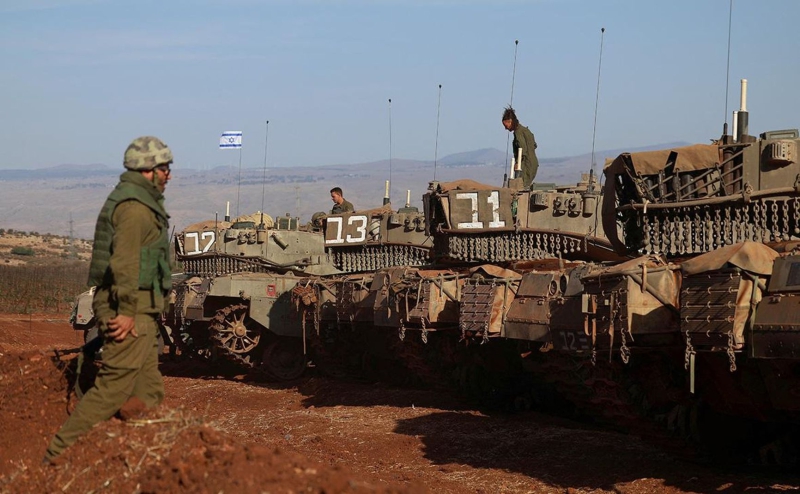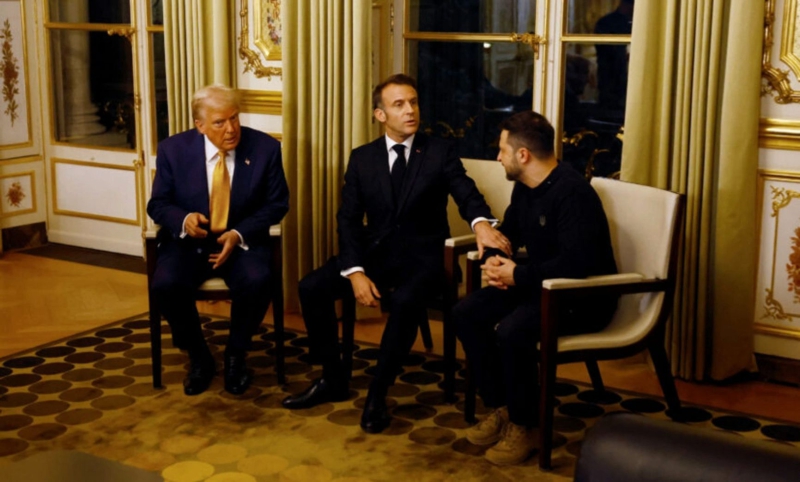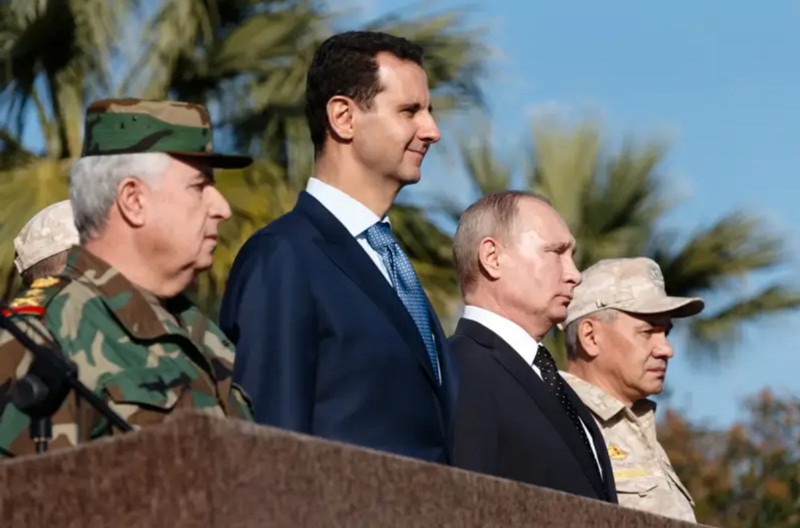The collapse of the Assad regime in Damascus represents a devastating blow for Iran, whose influence in the Middle East has nearly vanished. The process started with Israel’s campaign against Hamas, continued as Lebanon’s Hezbollah suffered devastating defeats, and has now made its way to Syria. This development is equally damaging for Vladimir Putin. By committing to a military alliance with Iran and abandoning his previous balancing act between Sunni and Shia factions, Putin had already sacrificed much of Russia’s leverage in the region — and beyond. Now, the loss of military bases in Syria threatens to erode Moscow’s ability to maintain its foothold in Africa. This outcome highlights Russia’s lack of a coherent foreign policy strategy. Instead of a clear vision, the Kremlin relies on short-term tactical alliances and the personal loyalty of its partners, argues Ivan Preobrazhensky.
Hamas lit the fuse
Who could have predicted on October 7, 2023, when Hamas launched its massive terrorist attack on Israel, that the war ignited in the Gaza Strip would ultimately lead to the fall of the Assad regime in Syria? A family that had controlled the country for decades vanished almost overnight.
Now, just over a year later, the sequence of events is clear. In response to the Hamas attack, the Israeli military launched a counterterrorism operation that escalated into a full-scale clearing of the Gaza Strip. On one side, thousands of Israelis were killed, and hostages remained in captivity. On the other, thousands of Palestinians lost their lives, while Israel faced mounting international pressure. It appeared the region had plunged into yet another protracted conflict with no resolution in sight.

The conflict, however, soon drew in other Iranian proxies in the region, including Yemen’s Houthis and Lebanon’s Hezbollah, a terrorist group that controls much of that country. In retaliation, Israeli strikes decimated not only Hezbollah’s senior leadership, but also its mid-level commanders. By the time a ceasefire was reached, it was evident that Hezbollah had been severely weakened, and without the continued provision of Iranian support — which has been routed through Syria — the Lebanese group faces potential collapse.
Meanwhile, Israel’s operations in Gaza and its strikes against Hezbollah triggered a broader exchange of missile attacks and terrorist actions between Israel and Iran. As a result, Tehran found itself excluded from the Syrian equation, with its military bases in Syria abandoned. Previously, Iran had relied on a dual-contingency strategy: when Hezbollah was tied up fighting Israel, Iranian forces would step in to support Assad’s regime. If Iranian forces were unavailable, Lebanese Shia fighters would fill the gap. But now, thanks to Israel’s actions, neither Hezbollah nor Iran’s military is capable of coming to Assad’s rescue.
Russia misjudged its allies
It’s no secret that the Kremlin nearly abandoned Assad at the onset of Syria’s civil war 13 years ago. At that critical juncture, Qasem Soleimani, commander of the Quds Force section of Iran’s Islamic Revolutionary Guard Corps, personally intervened, traveling to Moscow to meet with Vladimir Putin. After several rounds of discussions, Soleimani convinced the Russian leader that the Syrian regime could be saved — and that coming to its aid could even be profitable. Heeding Iran’s advice, Russia intervened, and for a time, it did indeed reap considerable benefits.
The Kremlin nearly abandoned Assad at the onset of Syria’s civil war 13 years ago
When hundreds of thousands of Syrian refugees began pouring into the European Union, Russia took advantage of the chaos to foment political division in the democratic world. Meanwhile, on the ground in Syria, Moscow gained control over some oil fields, established a logistical hub for its African projects, retained its naval base in Tartus, acquired several airfields, and secured a location to train its forces under near-combat conditions. These efforts included testing new missiles and military equipment in real-world scenarios, preparation that proved invaluable when the larger war against Ukraine got off to a less than auspicious start. The Wagner Group, which had been actively fighting in Syria for years, played a significant role in stabilizing the Russian war effort — alongside generals and officers of the regular Russian army who had also gained experience in the Syrian theater.

The Kremlin undoubtedly believed it was winning in the Middle East, particularly through its alliance with Iran. When Russia needed further military assistance in its war against Ukraine, it turned to Iran, with whom it had already established close cooperation. As a result, Russian forces likely had prior knowledge of the performance characteristics of some Iranian equipment, such as drones.
However, the Kremlin failed to notice how its close ties with Iran had begun to alienate other influential forces in the Middle East and the Persian Gulf. Russian strategists likely thought they had struck a highly advantageous deal. As the situation in Syria stabilized and tensions escalated in Ukraine, Russia left only a small contingent of what were essentially police forces in Syria. Most of them remained under Bashar al-Assad's control and relied entirely on Iran for support.
That reliance proved to be a critical miscalculation. Russia is losing not only Syria, but the revenue streams the country provided. This money not only benefited figures like Yevgeny Prigozhin, but also likely enriched many Russian generals. Now it is unclear whether Russia will be able to maintain access to its military bases in Syria — outposts that are crucial for sustaining its extensive network of influence in Africa. Without its hub in the Mediterranean, how will Moscow support Field Marshal Khalifa Haftar in Libya, the African Corps of the Russian army, pro-Russian juntas in the Sahel region, or provide security for Chinese companies operating in Africa?
And that’s not all. On Dec. 7, as Bashar al-Assad was fleeing Damascus for his life, Donald Trump was in Paris attending an unofficial summit tied to the reopening of Notre Dame Cathedral. There, the U.S. President-elect met with Ukrainian President Volodymyr Zelensky. Afterward, Trump commented on both Syria and Ukraine, calling on Putin to engage in negotiations and mockingly referencing Russia’s retreat from Syria.
Whatever the Kremlin does next, the fall of the Assad regime is being interpreted globally as a personal defeat for Vladimir Putin. His bet on Iran — and with it, the Assad regime — has firmly placed him in the losing camp.
Whatever the Kremlin does, the fall of the Assad regime is being perceived globally as a personal defeat for Vladimir Putin

Over the years, the Kremlin has severely damaged its relationship with Israel, where it has been openly accused of supplying weapons to Hezbollah and supporting Hamas — to say nothing of its military alliance with Iran. For the same reasons, its friendship with Saudi Arabia has cooled. Meanwhile, Turkey has not only driven Russia out of the South Caucasus and helped Azerbaijan seize Nagorno-Karabakh but is now poised to use pro-Turkish rebels to eliminate the last potentially pro-Russian forces in Syria.
No diplomacy, no strategy
Russia once practiced a policy of balancing the interests of other players and exploiting chaos for its benefit, but by changing tack and positioning itself as a friend to authoritarian regimes and a military ally of Iran, Putin’s Russia set itself up to suffer a significant strategic defeat. Moscow has prioritized tactical alliances over long-term interests and short-term profits over sustainable gains. This approach has led to the gradual erosion of much of the network of alliances and structures that the Kremlin had spent at least 15 years building in the Middle East and Africa.
Moscow has prioritized tactical alliances over long-term interests and short-term profits over sustainable gains
The main consequences of the policy for which Vladimir Putin is personally responsible are most evident in Syria, but they have also manifested closer to home. At a certain point, Putin began prioritizing Russia's strategic interests below his personal preferences, allowing his animosity toward Armenian Prime Minister Nikol Pashinyan and his fraught relationship with Erdogan to trump geopolitical considerations.
These failures are now reinvigorating the international coalition supporting Ukraine in its struggle to fend off Russian aggression. While this, too, may be more of an emotional response, it is clear that in order for a situation on the ground in the full-scale war to begin changing, third parties who once saw the future as inevitable must come to recognize that the emperor has no clothes. Assad’s flight to Moscow has helped in this regard.

